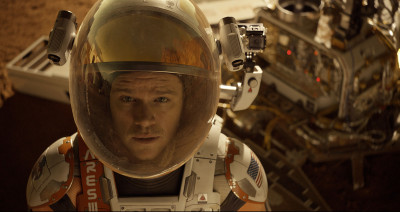
After hearing of a film called “The Martian” directed by “Alien” creator Ridley Scott, it would be easy to assume that the story is also about an alien. However, the title actually refers to a lone astronaut abandoned on Mars’ surface, played by Matt Damon.
This quick summary might draw comparisons to Christopher Nolan’s sci-fi epic “Interstellar,” in which Damon also plays an astronaut alone on a faraway planet. However, unlike the horror-infested world of “Alien” or the mind-bending theoretical physics of “Interstellar,” “The Martian” is as close to real-life as science fiction can get. Based on the book of the same name by computer programmer Andy Weir, the film takes place in a near future that is in every way our modern world, aside from two successfully manned NASA missions to Mars.
Mark Watney (Matt Damon) is a botanist on the third Mars mission, Ares 3, which is forced to abort early due to an intense dust storm occurring after the mission’s arrival on the planet. In the frenzy of the storm, Mark loses contact with the rest of his crew, who leaves, believing him to be dead. When the storm passes, Mark has to figure out a way to survive while entirely alone on the Red Planet.
The Mars segments of “The Martian” are told almost exclusively through Mark’s video logs, in which he explains the science behind what he needs to do to survive. Thanks to his humor and Damon’s compelling acting, the exposition overload is never dull, and rooting for Mark is easy.
Also rooting for Mark are his crewmates, made up of the meticulous Commander Melissa Lewis (Jessica Chastain), wise guy Rick Martinez (Michael Peña), computer whiz Beth Johanssen (Kate Mara), German family man Alex Vogel (Aksel Hennie) and medic Chris Beck (Sebastian Stan). The crew is on the spaceship headed home throughout the course of the film, while the rest of the ensemble cast — including Kristen Wiig, Donald Glover and Sean Bean — assembles a rescue plan for Mark down on Earth. Vincent Kapoor (Chiwetel Ejiofor) is essentially the protagonist of the segments on Earth, with NASA Director Teddy Sanders (Jeff Daniels) serving as a foil and the closest the movie comes to a true antagonist.
In a survival story like “The Martian,” though, the truer antagonist is Mars and space itself. However, the film never depicts the planet or space in a poor light. Thanks to stunning cinematography of Mars’ desert landscapes and views of the cosmos, Earth and Mars feel worshipful and awe-inspiring, but never cold or cruel. The beauty and spectacle are some of the things keeping Mark so positive, even in the face of unimaginable odds.
The gorgeous cinematography also highlights these odds, showing just how alone Mark is. “I am the first man to be alone on an entire planet,” Mark says, matter-of-factly. “The Martian” does not dwell on the bleakness of his situation, though it does not allow the audience to forget how close to death Mark is at all times. The plots arises naturally out of the life-or-death scenario and the film’s otherworldly setting raises the stakes high enough that additional subplots are unnecessary.
When Mark is alone, the real focus of the film is the unity of the people on Earth, working together to rescue him. It is not just a problem for NASA, for America or a corporation. In space, there are no alliances to countries or even specific people. When one man faces the entire cosmos, it is humanity as a whole who takes responsibility. The world is rooting for Mark Watney, and that sense of community is a testament to everything good about people.
“The Martian” is, additionally, a testament to everything good about science. Space-related science is at the forefront of the film, made evident by its ad campaign, which works in tandem with the NASA discovery of liquid water on Mars and even includes support from famed scientist Neil deGrasse Tyson.
Almost every faculty of science is glorified in the film — engineers on Earth design rockets to supply the missions, astrophysicists plot the course of the ships and Mark himself uses chemistry and simple math in addition to his botany skills and Swiss-army knife for survival.
In this way, “The Martian” is simultaneously realistic and inspiring. Though Mark constantly faces death, he is continually upbeat and motivated because he truly believes in the work he is doing. That work, explained in accurate, scientific detail, is fascinating no matter how well one did in high school chemistry. Simply put, science is cool. Space travel is cool, even if it’s unbelievably dangerous. “The Martian” will likely inspire a new generation of kids to become astronauts, and in a few decades, maybe some of them will be landing on Mars.

















































































































